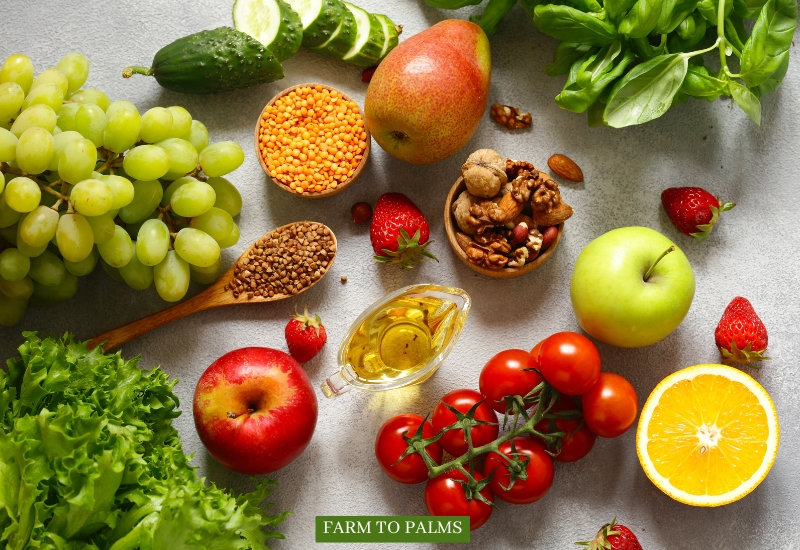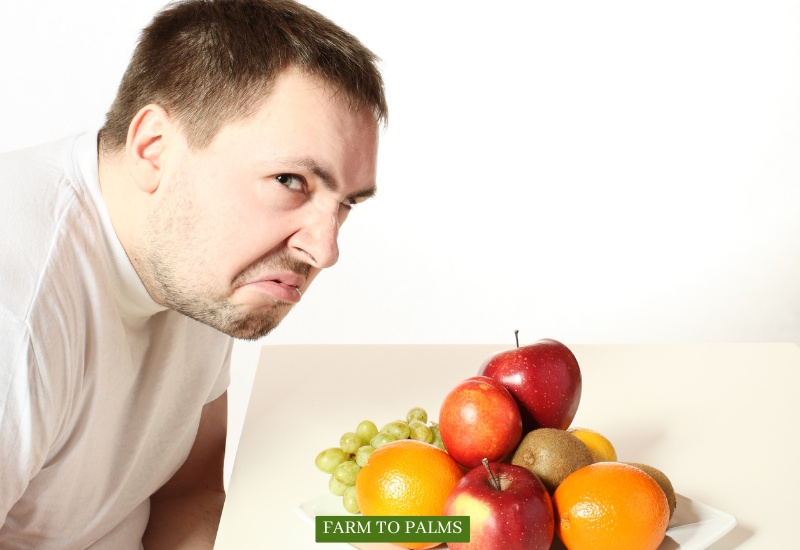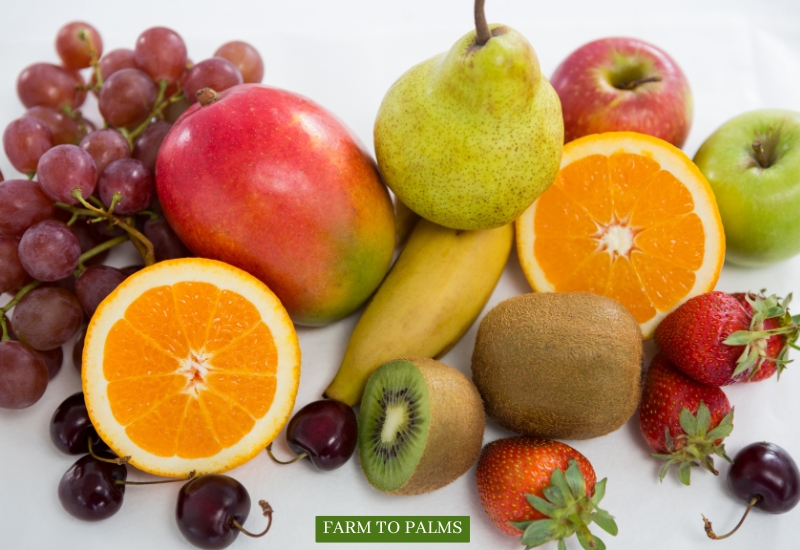Eating fruit as part of your daily diet is good for your health, but when is the best time to eat it? Much debate is about the best time to eat fruit and which types benefit the body. Read this article right away to get your questions answered.
Everyone knows that fruits are a healthy food source that is convenient to carry around without needing elaborate preparation to be consumable. However, only some fruits are beneficial, and their consumption is only sometimes advisable at any given time. Many fruits contain high sugar levels, which may not be suitable for those on a diet. Also, regarding the timing of consumption, some types might be better for people with digestive or stomach issues. The following article will discuss how to use and choose fruits that are good for your health. Stay tuned.
The best time to eat fruit

Fruit is an essential part of a healthy diet, a rich source of vitamins, minerals, natural sugars, enzymes, fiber, and antioxidants. Therefore, it is also essential to consider the best time to consume them to maximize their benefits. Some people should eat fruit on an empty stomach, while others may benefit from eating it after a meal, and some might find it best to eat fruit after waking up… Study the following article carefully to choose the most appropriate time to eat fruit for yourself.
Eat fruit in the mornings.

According to nutrition experts, eating fruit daily is one of the best solutions for maintaining good health. Some studies have shown that eating fruit and drinking water in the morning is very beneficial. When you consume fruit on an empty stomach, the fruit helps the body’s detoxification processes work better, and nutrients are absorbed more efficiently and effectively when the stomach is empty.
Fruits contain a certain amount of sugar, depending on the type, which provides a good energy boost to the body after a long sleep. However, it should be noted that people with a history or current diagnosis of diabetes should choose fruits that are low in sugar and avoid fruits that are high in sugar as they can negatively impact health.
Many people worry about stomach pain or discomfort when consuming fruit on an empty stomach, especially acidic fruits like oranges and lemons, but this is incorrect. According to Dr. Herbert Shelton, fruits become alkaline in the body. Therefore, eating fruit on an empty stomach will bring sound effects without any harm.
Eat fruit when hungry.

In addition to exercising and on a diet, they also need to pay attention to their eating habits. They should avoid foods high in calories or carbohydrates, especially when hungry, because their bodies will absorb more nutrients than usual.
Fruits are low in calories, rich in nutrients, and high in dietary fiber. Fiber is an essential part of all diets and is beneficial for gut health. Because fiber slows digestion, it helps individuals feel fuller for extended periods. Therefore, for those looking to lose weight, eating fruit when hungry is advisable as an alternative to other foods. This practice provides energy for the body and does not contribute to weight gain, making it an indispensable part of the weight loss journey.
Eat fruit right before or after a meal.

Eating fruit before or after meals is a familiar concept to many people. Instead of having a full meal, one can supplement just a portion with fruit. The fiber in fruit helps us feel fuller for longer, and because it is low in calories, it won’t lead to weight gain.
People with diabetes often mistakenly think that they must consume fruit one to two hours before or after meals due to the digestive issues they typically face. However, there is no evidence eating fruit separately during meals improves digestion. On the contrary, consuming fruit on its own may cause blood sugar levels to rise faster, potentially leading to higher blood glucose levels compared to eating fruit with other foods.
Research on the impact of fat, protein, and glycemic index on post-meal blood sugar control in type 1 diabetes shows that protein, fiber, and fats help slow down the stomach’s food release into the small intestine. This way, the body absorbs less sugar at once, limiting its impact on blood sugar levels.
Therefore, instead of eating fruit alone, people with diabetes should eat fruit before or immediately after a meal. Combining fruit with other foods high in protein, fiber, or fat may reduce the likelihood of a spike in blood sugar levels when eaten alone.
Eat fruit before and after training.

Those who practice sports pay great attention to a proper diet to increase muscle, reduce fat, or maintain their desired weight. Fruit is one of the foods they trust in their training process.
Eating fruit before exercising provides an immediate source of energy that helps you endure high-intensity workouts.
The same is true after exercising; your body has been active and lost energy. It would help replenish your body with fruit before adding other primary food sources to regain strength.
You can choose some fruits to eat before and after exercising, such as bananas, mangoes, grapes, avocados, tangerines, pomegranates, and pears. These fruits will provide your body with essential electrolytes and energy.
Times when you should not eat fruit

As mentioned above, everyone can eat fruit at any time of the day, depending on the individual and their goals, and choose the appropriate time.
However, for some people, it is essential to be cautious when consuming fruit to avoid unwanted effects: those with weak digestive systems should avoid eating fruit right after or before a meal, as the high fiber content can cause indigestion and discomfort due to bloating. It’s best to consume fruit 1-2 hours after the digestive system has processed the previous meal. Avoid acidic fruits such as oranges, grapefruits, and mangoes to limit the increase of acid in the stomach.
You should not eat fruit before sleep because it can increase insulin and blood sugar levels. This can disrupt your sleep and prevent you from sleeping well.
Nevertheless, not all fruits consumed before bed are harmful to your health. Like bananas, eating fruits that contain potassium can help minimize the risk of muscle cramps. Fruits high in magnesium, like apricots and dates, can also help you sleep better. Therefore, you need to research and choose the most suitable types of fruit for yourself.
The types of fruits that should be included for good health

Fruits are a fantastic source of essential vitamins and minerals, rich in fiber, and provide numerous antioxidants that enhance health. People who consume various fruits and vegetables as part of a healthy diet are less likely to develop some chronic diseases.
Each type of fruit offers unique nutrients and benefits. Eat various colored fruits, as each color provides other nutrients. Here are some fruits that are good for our bodies:
- Apples: They are rich in both soluble and insoluble fiber, such as pectin, hemicellulose, and cellulose. These help control blood sugar levels, promote digestion, and support gut and heart health.
- Bananas: Bananas provide a good amount of potassium and vitamins B6, C, and magnesium, as well as plant compounds like polyphenols and phytosterols, which support overall health. Moreover, they contain plenty of prebiotics, a fiber that promotes the growth of beneficial bacteria in the gut.
- Oranges: Known for their high vitamin C content, providing 91% of the daily value (DV) in one fruit. They also contain potassium, folate, thiamine (vitamin B1), fiber, and plant polyphenols. Studies have found that eating whole oranges can reduce inflammation, blood pressure, cholesterol, and post-meal blood sugar levels.
- Dragon fruit: Rich in nutrients, including fiber, iron, magnesium, and vitamins C and E. It’s also an excellent source of carotenoids such as lycopene and beta-carotene.
- Mangoes are an excellent source of potassium, folate, fiber, and vitamins A, C, B6, E, and K. They are also rich in plant polyphenols with antioxidant and anti-inflammatory properties. In particular, mangoes contain a lot of mangiferin, a potent antioxidant. Studies suggest it may protect against chronic illnesses such as type 2 diabetes, heart disease, Alzheimer’s, Parkinson’s, and certain forms of cancer. Additionally, mangoes contain fiber that helps support regular bowel movements and digestive health.
- Avocados are rich in healthy fats and low in natural sugars. They are mostly made up of oleic acid, a monounsaturated fat that benefits heart health. They also contain large amounts of potassium, fiber, vitamin B6, folate, vitamins E and K, and two types of carotenoids, lutein and zeaxanthin, that support eye health.
- Watermelon contains antioxidants such as vitamins A and C, beta-carotene, and lycopene. It’s also a good source of potassium and magnesium. Notably, watermelon is one of the leading sources of lycopene, a carotenoid that gives watermelon its pink-red hue. A diet rich in lycopene can help reduce oxidative stress and inflammation. This nutrient may also decrease the risk of heart disease, cancer, and type 2 diabetes.
- Kiwi: Contains high amounts of vitamin C and is a source of fiber, potassium, folate, and vitamin E. It’s also rich in carotenoids, including lutein, zeaxanthin, and beta-carotene, which become more prominent as it ripens and supports eye health. A randomized controlled trial on the fundamental mechanisms by which kiwi affect bowel function showed that consuming two kiwis daily for three days increased stool frequency and softened stools, suggesting it may help treat mild constipation.
- Guava is a rich source of vitamin C. Additionally, guava contains one of the highest amounts of lycopene compared to other lycopene-rich foods like tomatoes, watermelon, and grapefruit. It also has other antioxidants, such as beta-carotene and various flavonoids. Because guava is so nutrient-dense and rich in antioxidants, regular consumption can support the health of your eyes, heart, kidneys, and skin.
- Grapefruit: One of the healthiest citrus fruits. It contains plenty of vitamin C, potassium, fiber, and beta-carotene that your body converts to vitamin A. According to an article on grapefruit consumption related to higher nutrient intake and better diet quality among adults observed in a study including 12,789 participants, eating grapefruit was associated with higher levels of HDL (good) cholesterol and reductions in body weight, waist circumference, body mass index (BMI), triglycerides levels, and inflammation markers. Furthermore, regularly eating grapefruit may aid in weight control and enhance cardiovascular health.
How to Select and Store Fresh Fruits
The importance of fresh fruits and vegetables in a healthy diet is widely acknowledged for maintaining good health and preventing various ailments. However, selecting and storing fresh fruits to maximize their nutritional value can be challenging. Here are some refined suggestions for choosing and preserving fresh fruits to ensure optimal nutrition:
Tip #1: Purchase Fresh Fruits at the Right Time
It is imperative to buy fruits when they are in season as they are more abundant, fresher, and richer in nutrients. Seasonal fruits are not only more nutritious but also tend to be more cost-effective. Familiarize yourself with the seasonal availability of fruits either by visiting local farmers’ markets or researching online. While staples like apples, bananas, and oranges are always accessible, delicacies like cherries, peaches, and strawberries are only available during specific times of the year.
Tip #2: Opt for Fresh, Vibrant Colors
Choose fresh fruits with vibrant colors, as they often indicate the presence of essential nutrients. For instance, red fruits like strawberries and watermelons contain lycopene, a potent antioxidant that safeguards cells from damage. Avoid fruits that appear dull, bruised, or blemished, as these could be signs of decay or spoilage, resulting in decreased nutritional value and potential health risks.
Tip #3: Utilize Your Sense of Smell
A fruit’s freshness can also be determined by its scent. Ripe and fresh fruits emit a pleasant fragrance, while sour or musty odors may indicate overripeness or decay.
Tip #4: Choose Organic
Opt for organic fruits to avoid harmful chemicals like pesticides, herbicides, and fertilizers used in conventional farming practices. Organic fruits promote healthier living by reducing exposure to toxic substances.
Tip #5: Implement Proper Storage Techniques
After selecting your fresh fruits, it is essential to store them correctly to maintain their freshness and nutritional value. Here are some storage recommendations for different types of fruits:
- Berries: Store delicate berries in a single layer in the refrigerator and wash them only before consumption.
- Apples: Keep apples in a cool, dark place away from other fruits to prevent premature ripening.
- Bananas: Store bananas at room temperature until ripe, then refrigerate to prolong their freshness.
- Citrus Fruits: Store citrus fruits at room temperature for short-term storage or refrigerate for extended shelf life.
Tip #6: Freeze Fruits
Freezing fruits is an effective way to preserve their nutrients and extend shelf life. Most fruits, including berries, bananas, and citrus fruits, can be frozen after thoroughly washing, removing stems/seeds, and chopping into small pieces. Ensure proper storage in airtight containers or plastic bags for optimal preservation.
Tip #7: Consume Fresh Fruits Promptly
For maximum nutritional benefits, consume fresh fruits soon after harvesting. Eating fruits within a few days of purchase helps retain their nutritional value.
How to preserve fruit to prolong its shelf life
To preserve fruits and extend their shelf life, here are some valuable tips:
- Refrigeration: Store fruits like watermelon, cantaloupe, and other fresh fruits in the refrigerator to keep them fresh and extend their shelf life.
- Fruit segregation: Avoid mixing different types of fruits when storing them to prevent adverse impacts on their quality.
- Proper temperature storage: Some fruits like bananas, mangoes, and pears can be stored outside to ripen or at room temperature to avoid rapid spoilage.
- Use of food storage bags: To keep fruits fresh longer, use food or nylon bags to prevent direct contact with air.
- Regular inspection: Regularly check fruits in the refrigerator or storage area to discard any spoiled or ripening ones to prevent them from affecting others.
Distinguish between organic and non-organic fruits.
| Difference | Organic Foods | Non-organic Foods |
|---|---|---|
| Taste | Usually, it tastes more wholesome and nourishing due to natural production without artificial chemicals, retaining the original taste and textures. | They may lack the wholesome taste of organic foods as they are produced using artificial or non-organic ingredients. |
| Nutrient Content | It is richer in essential nutrients like vitamins, minerals, micronutrients, enzymes, Omega 3s, and antioxidants, which aid in disease prevention. | It contains fewer essential nutrients than organic foods, potentially impacting health benefits. |
| Environmental Impact | Better for the environment by reducing pollution, conserving water, enhancing soil fertility, and promoting wildlife and human health. | It may contribute to pollution, water depletion, soil erosion, and harm to wildlife and human health due to synthetic pesticides and intensive farming. |
| Cost | Generally more expensive due to costly production processes, strict regulations, labor intensity, and lower crop yields. | Typically, they are less expensive as production costs are lower, regulations may be less stringent, and crop yields are often higher. |
Fruits are incredibly nutritious and form an essential part of a healthy diet. Hopefully, the above article has helped everyone understand how best to incorporate fruits into their diet at the correct times and choose the types that suit their individual needs for their daily menu.
Visit Farm to Palms supermarket today to enjoy fresh, vibrant fruits! Committed from the farm to your palm, every piece of fruit guarantees flavor and quality. Your health, our joy. Don’t miss out!
